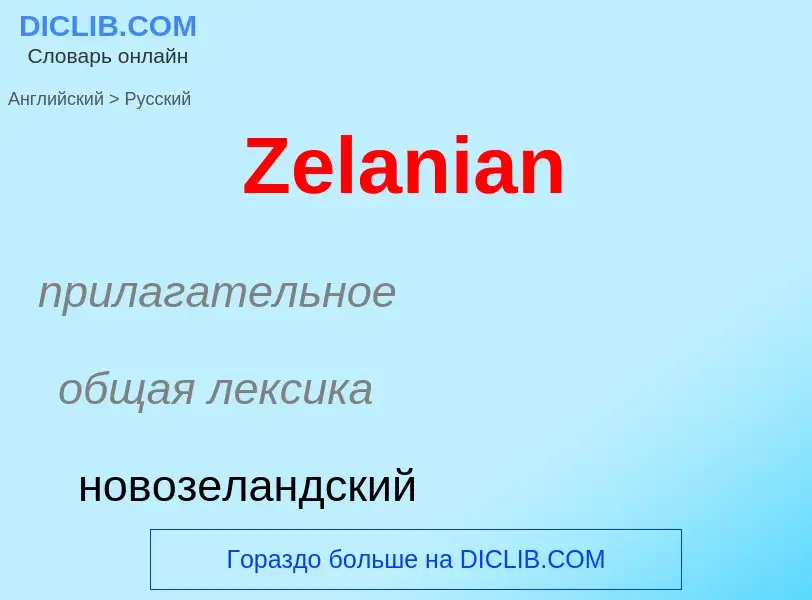Μετάφραση και ανάλυση λέξεων από την τεχνητή νοημοσύνη ChatGPT
Σε αυτήν τη σελίδα μπορείτε να λάβετε μια λεπτομερή ανάλυση μιας λέξης ή μιας φράσης, η οποία δημιουργήθηκε χρησιμοποιώντας το ChatGPT, την καλύτερη τεχνολογία τεχνητής νοημοσύνης μέχρι σήμερα:
- πώς χρησιμοποιείται η λέξη
- συχνότητα χρήσης
- χρησιμοποιείται πιο συχνά στον προφορικό ή γραπτό λόγο
- επιλογές μετάφρασης λέξεων
- παραδείγματα χρήσης (πολλές φράσεις με μετάφραση)
- ετυμολογία
Zelanian - translation to ρωσικά
прилагательное
общая лексика
новозеландский
существительное
общая лексика
Новая Зеландия
синоним
Βικιπαίδεια
New Zealand (Māori: Aotearoa [aɔˈtɛaɾɔa]) is an island country in the southwestern Pacific Ocean. It consists of two main landmasses—the North Island (Te Ika-a-Māui) and the South Island (Te Waipounamu)—and over 700 smaller islands. It is the sixth-largest island country by area, covering 268,021 square kilometres (103,500 sq mi). New Zealand is about 2,000 kilometres (1,200 mi) east of Australia across the Tasman Sea and 1,000 kilometres (600 mi) south of the islands of New Caledonia, Fiji, and Tonga. The country's varied topography and sharp mountain peaks, including the Southern Alps, owe much to tectonic uplift and volcanic eruptions. New Zealand's capital city is Wellington, and its most populous city is Auckland.
The islands of New Zealand were the last large habitable land to be settled by humans. Between about 1280 and 1350, Polynesians began to settle in the islands and then developed a distinctive Māori culture. In 1642, the Dutch explorer Abel Tasman became the first European to sight and record New Zealand. In 1840, representatives of the United Kingdom and Māori chiefs signed the Treaty of Waitangi, which in its English version declared British sovereignty over the islands. In 1841, New Zealand became a colony within the British Empire. Subsequently, a series of conflicts between the colonial government and Māori tribes resulted in the alienation and confiscation of large amounts of Māori land. New Zealand became a dominion in 1907; it gained full statutory independence in 1947, retaining the monarch as head of state. Today, the majority of New Zealand's population of 5.1 million is of European descent; the indigenous Māori are the largest minority, followed by Asians and Pacific Islanders. Reflecting this, New Zealand's culture is mainly derived from Māori and early British settlers, with recent broadening of culture arising from increased immigration. The official languages are English, Māori, and New Zealand Sign Language, with the local dialect of English being dominant.
A developed country, New Zealand ranks 13th in the Human Development Index. The country was the first to introduce a minimum wage, and the first to give women the right to vote. New Zealand underwent major economic changes during the 1980s, which transformed it from a protectionist to a liberalised free-trade economy. The service sector dominates the national economy, followed by the industrial sector, and agriculture; international tourism is also a significant source of revenue. Nationally, legislative authority is vested in an elected, unicameral Parliament, while executive political power is exercised by the Cabinet, led by the prime minister, currently Chris Hipkins. Charles III is the country's king and is represented by the governor-general. In addition, New Zealand is organised into 11 regional councils and 67 territorial authorities for local government purposes. The Realm of New Zealand also includes Tokelau (a dependent territory); the Cook Islands and Niue (self-governing states in free association with New Zealand); and the Ross Dependency, which is New Zealand's territorial claim in Antarctica.
New Zealand is a member of the United Nations, Commonwealth of Nations, ANZUS, UKUSA, OECD, ASEAN Plus Six, Asia-Pacific Economic Cooperation, the Pacific Community and the Pacific Islands Forum.


.jpg?width=200)
.jpg?width=200)

![Autumn in [[Christchurch]] Autumn in [[Christchurch]]](https://commons.wikimedia.org/wiki/Special:FilePath/Christchurch Botanic Gardens in autumn.jpg?width=200)




![national rugby union team ("All Blacks")]] before a game. The haka is a challenge with vigorous movements and stamping of the feet. national rugby union team ("All Blacks")]] before a game. The haka is a challenge with vigorous movements and stamping of the feet.](https://commons.wikimedia.org/wiki/Special:FilePath/Haka 2006.jpg?width=200)




![New Zealand Prime Minister [[Jacinda Ardern]] with US President [[Joe Biden]] in the [[Oval Office]], 2022 New Zealand Prime Minister [[Jacinda Ardern]] with US President [[Joe Biden]] in the [[Oval Office]], 2022](https://commons.wikimedia.org/wiki/Special:FilePath/P20220531AS-0492-2 (52245764500).jpg?width=200)






![Queenstown]] Queenstown]]](https://commons.wikimedia.org/wiki/Special:FilePath/NZ Landscape.jpg?width=200)
![West Coast]] West Coast]]](https://commons.wikimedia.org/wiki/Special:FilePath/TWC Hokitika Gorge • Stewart Nimmo • MRD 16.jpg?width=200)
![The Emerald Lakes, [[Mount Tongariro]] The Emerald Lakes, [[Mount Tongariro]]](https://commons.wikimedia.org/wiki/Special:FilePath/Emerald Lakes, New Zealand.jpg?width=200)
![[[Lake Gunn]] [[Lake Gunn]]](https://commons.wikimedia.org/wiki/Special:FilePath/Lake Gunn.jpg?width=200)
![[[Pencarrow Head]], Wellington [[Pencarrow Head]], Wellington](https://commons.wikimedia.org/wiki/Special:FilePath/Pencarrow Head, Wellington, New Zealand from Santa Regina, 24 Feb. 2007.jpg?width=200)
